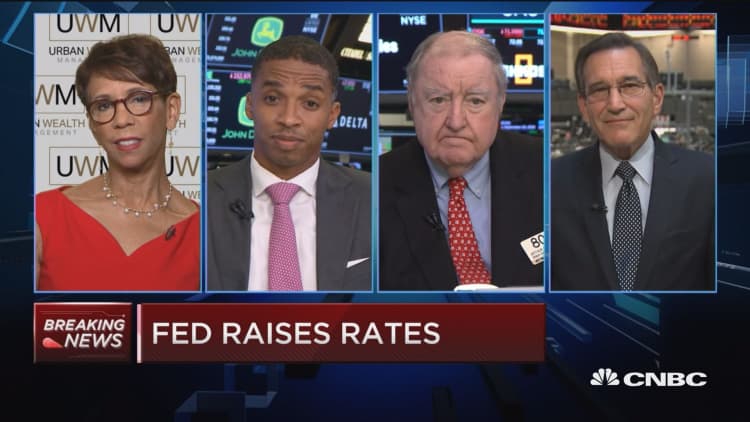
Removing the word "accommodative" from the Federal Open Market Committee meeting statement indicates Chairman Jerome Powell thinks the interest rates are very close to normal, Wall Street veteran Art Cashin told CNBC on Wednesday.
"What the chairman did right now was he pulled a Goldilocks, he said policy is just right right now," Cashin said on CNBC's "Closing Bell."
"I think by removing the word 'accommodative,' he pretty much said we might be at the spot where rates belong right now," said Cashin, director of UBS' floor operations at the NYSE.
The Fed raised interest rates on Wednesday and left its monetary policy outlook for the coming years largely unchanged amid steady economic growth and a strong job market. As widely anticipated, the policymaking FOMC increased the fed funds rate 25 basis points, which takes the interest rate to a range of 2 percent to 2.25 percent.
The Fed had kept its target rate anchored near zero from December 2008 until this hiking cycle began as it sought to bring the economy out of the financial crisis. Since then, the central bank has sought to normalize policy through consistent but gradual increases.
The latest step in the normalization process was the committee's move to drop language saying that "the stance of monetary policy remains accommodative," suggesting the Fed could be moving toward a neutral fiscal policy, which seeks neither to stimulate nor slow economic growth.
During a press conference, Powell dismissed the updated language, saying the removal of "accommodative" from the statement "does not signal any change in the likely path of policy; instead, it is a sign that policy is proceeding in line with our expectations."
But Cashin disagreed.
"It's not nothing. I mean, it's a modifier, and it's a descriptive modifier. Accommodative means that we are doing a little extra to try to accommodate the economy and move things along," Cashin said.
And the slight pullback in the market demonstrates the markets see a bumpier road ahead, Cashin said.
"I think that the market thought we were in a kind of magic sweet spot where the Fed would be cautious enough that they wouldn't keep moving ahead," Cashin said.
"After some reflection, the market is probably saying, 'Well, wait a minute, things aren't quite as easy as we thought they should be' ... that's why I think you are seeing stocks go slightly negative," he said.
In a "Power Lunch" interview, "Fast Money" trader Steve Grasso said he felt the adjustments were already priced into the markets.
"You would think this was a real dovish commentary if you took away what the Fed just did. So I think the markets, a little bit, sort of settled in with what they expected," Grasso, director of institutional sales at Stuart Frankel, said on Wednesday. "I think its a foregone conclusion that the market understands that rates are moving higher. But they are just absorbing now in the marketplace."
The FOMC continued to project one more rate hike before the end of the year and three in 2019. As for what's next, Cashin said traders should take a hint from Powell's press conference and look to the dollar and to trade.
Powell "said the dollar doesn't matter for the treasury, but we're watching it — and he's very careful to say that. And he talked about trade — and they're watching it. So the Fed is really caught up in a variety of other things. And that's a message to traders what to keep an eye on," Cashin said.
Stocks closed lower on Wednesday, giving up earlier gains. The Dow Jones Industrial Average fell 106.93 points to 26,385.28, while the declined 0.3 percent to 2,905.97. The Nasdaq Composite fell 0.2 percent to 7,990.37.
— CNBC's Fred Imbert and Jeff Cox contributed reporting.


